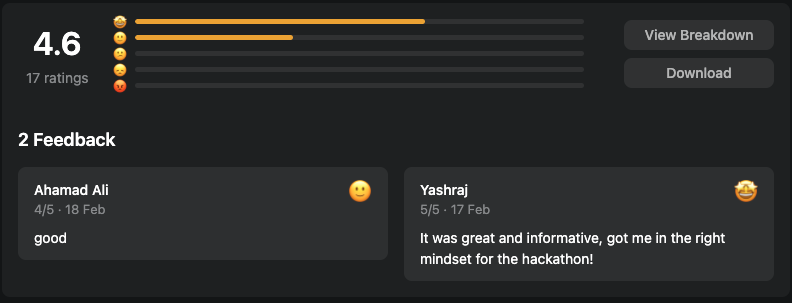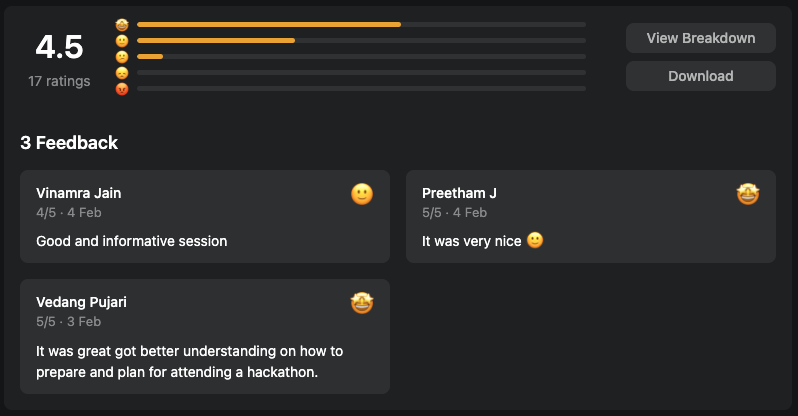Guiding FOSS Hack participants on what to build
For FOSS Hack 2025, we collaborated with Aruna and Gautham from The Second Design to enhance participant outcomes.
“To build or not to build” is not the question that most FOSS Hack participants face; instead, it is “What to build?”. Some participants might tell you what they want to build, but if you probe deeper, they aren’t able to articulate why they chose that particular problem to solve or why they believe their solution is appropriate. These are tough questions to answer, and it takes some perspective and hands-on experience to answer them. FOSS Hackathons happen left and right, but ensuring the participants understand these deeper motives is key to making them sustainable and meaningful in the long run.
In late 2024, Kailash put us in touch with Aruna and Gautham from The Second Design. They were interested in working together to instil agency and critical thinking in young folks. Previously, they organized a few sessions with TinkerHub that were received well, and we started talking to them about how they could help us improve our student initiatives. After some back and forth, we decided to pursue a short-term project to improve outcomes for the 2025 FOSS Hack hackathon, where most of the participants are students. After conversations and interactions with the FOSS United Community, they put together a session for the Hackathon participants to improve outcomes. We rolled out the session to a few participants of the Hackathon with great feedback.
Here are thoughts from Aruna and Gautham regarding their experience
Work That Resonated With Us
This stint with FOSS United was deeply aligned with what we love doing - working with undergraduate students, helping them gain clarity, and enabling them to build better lives and careers through thoughtful interventions. Guiding students toward a well-designed future is something we’re passionate about, and this collaboration provided us with an avenue for that. That way, it was a meaningful and fulfilling experience for us.
How did we approach the specific intervention at FOSS Hack 2025?
The objective that was communicated to us: Improve the outcomes of the projects that come out of FOSS Hack 2025.
Our core premise was this.
Yes, students participating in a hackathon are already displaying agency. However, if we break it down, a student displaying agency when writing code might not exhibit the same level of agency-laden behaviour when deciding on a good product idea. Similarly, while good student developers often tend to be above-average writers, producing high-quality README documentation depends on their ability to communicate and put themselves in the shoes of an average reader, which might not match the level of effort they put into writing high-quality code.
Agency varies across domains. For example, the agency required to collaborate with a team, reach out to a mentor, or navigate other interpersonal aspects of a hackathon is different from the agency shown while writing good code or learning a new programming language.
The intervention we did through this session was designed to enhance the agentic behaviours students already possess while addressing areas where they might lack agency. This might seem like excessive hand-holding at times, but that’s fine. We can always course correct based on feedback.
What exactly did we do?
- As relative outsiders to the FOSS community, we extensively talked to the FOSS United team to understand the larger picture of FOSS, the role FOSS United seeks to play with respect to FOSS, and how FOSS Hack fits into the larger scheme of things.
- We understood how the hackathon worked - who would participate, how many, from where, as well as its timelines and requirements. We researched the hackathon registration process, the resources available on its website, and the winning projects of the previous hackathons.
- We converted the above broad objective of “improving outcomes for FOSS Hack 2025” into specific, tangible, measurable goals for the hackathon. We then used these goals to specify outcomes for the pre-hackathon session.
- We did this by working extensively with the FOSS United team to understand where projects
fell short in the previous hackathons. We learned that there were largely two problems
- What to build? Many students arrived on the morning of the hackathon asking, “What should I build?” They also made errors on licensing, not being FOSS-compliant.
- How to showcase their project. Participants would write poor readme files for their project, and not create demo videos, leaving their projects opaque to others who wanted to understand what they built.
- What did the session need to do?
- Convince students to focus on getting the basics of their project right instead of making grandiose plans.
- Hold the attention of the students, recognising their anxiety or ill-preparedness, reassuring them by exposing them to more examples, demonstrating how things are done, and providing them with a structure to help prepare for the hackathon.
- With specific outcomes in place, we designed a 90-minute session to focus on two themes: What to Build and How to Showcase Your Project. We incorporated multiple rounds of feedback from the FOSS United team to refine the session and workbook before launch, ensuring FOSS compliance.
- Session Style: The highly interactive session was online, conducted by two speakers, and consisted of several cycles of the “lecture-activity by attendee-feedback” loop. The session was accompanied by a workbook with activities that attendees would work through during the session.
- Participation numbers: Across all five sessions, we had 605 registrations and 217 participants.
Feedback from Students
Here is some feedback shared by students for some of these sessions


Observations and Thoughts
One of the most remarkable aspects of the FOSS United community is the high concentration of talent. The ability to bring together so many highly aligned individuals is phenomenal. Reading through the forum posts and discussions, we were struck by the sheer number of high-quality contributors - it’s rare to find such a concentrated group of technically skilled and thoughtful individuals.
The level of technical depth, problem-solving ability, and shared commitment to open-source principles is incredible. It’s genuinely mind-blowing to see how deeply skilled and aligned everyone is, and that’s a huge factor in why FOSS United is thriving.
However, we also notice that this strength can become a weakness—there’s a strong doubling down on technical aspects, sometimes at the cost of other critical, more human elements. As Rahul emphasised in the FOSS United strategic perspective for 2025, there has to be a mindset shift to communication/marketing/awareness/conversation-oriented thinking. Some areas lack thoughtful organization, particularly in how individuals navigate the community and contribute effectively.
While this organic evolution will naturally happen over time, the fact that an organization exists to further the cause means there’s an opportunity to intentionally design better pathways. If more people can meaningfully engage and contribute, the movement will grow, and the organization will have a greater impact.
Shifting focus from the organisational level to individual events such as FOSS Hack, there’s a vast scope for improving accessibility and user flow, making it easier for people to enter, engage, and progress. This is exactly what we worked on with stage-by-stage interventions and the 21-step process (see below), refining how participation flows.
We see a huge opportunity to improve how people engage with FOSS United at every level. This is also where we see a natural collaboration emerging. Our people and outcomes-focused approach complements the technical expertise so abundantly available in the FOSS United community. There’s a huge scope to sit together, strategize, and conduct experiments to refine these processes, ultimately leading to richer outcomes for the FOSS United organization and expanding its impact.
Closing thoughts
Aruna and Gautham are among a handful of individuals in India who have a solid understanding of the challenges faced by students in the FOSS ecosystem. Their novel intervention to improve the outcomes of the FOSS Hack participants was invaluable, both to the participants and to the FOSS United Foundation.
We were planning FOSS Hack 2025, the annual hackathon organized by FOSS United, when we were introduced to Aruna and Gautham. Thousands of students participate in the hackathon, and FOSS United organizes the hackathon to improve the quality of student activity in the Indian FOSS ecosystem. Over the years, we noticed that a significant fraction of the participants didn’t understand the fundamentals of FOSS, and this is what Aruna and Gautham decided to address using their novel intervention.
Aruna and Gautham designed a session for the hackathon participants to solidify their understanding of FOSS. As part of the session, they helped the students understand the qualities of good Free & Open Source Software, and how they can evaluate the problems that they are best suited to solve! Across multiple sessions, their intervention helped hundreds of FOSS Hack 2025 participants. Crucially, the intervention gave us the language and vocabulary we needed to communicate effectively with the participants who weren’t able to attend their sessions.
We look forward to working with them in the future, especially to shape programs like our year-round Student Club program.
21-step process outlining student participation in FOSS Hack
- Awareness
- Student developers across India heard about the FOSS movement
- A subset becomes part of the FOSS United community.
- They hear about FOSS Hack 2025
- They are motivated to participate after understanding the benefits and possible outcomes.
- Actually register to become part of FOSS Hack 2025
- Onboarding
- They get exposed to all the rules and understand them well
- They are actually capable of pulling off a good submission, in terms of code quality and overall polish
- Ideation and Team Formation
- Figure out the right project to work on - either a new one or an existing one.
- They get access to the right information to make an informed choice.
- They end up choosing a meaningful and useful problem statement.
- Find teammates through structured team-matching events, or by students mobilising teammates themselves, or decide to participate solo.
- Figure out the right project to work on - either a new one or an existing one.
- Validation of Ideas, Feedback, Mentor Access, Iterations
- Realise that they can seek help via mentors
- Get guidance on how to work with mentors effectively.
- Connect and collaborate with mentors in the different stages (idea validation, prototyping help, polish).
- Preparation
- Author a first draft of the README, using structured templates and examples.
- Use the README draft to plan a compelling demo video.
- Think through the right licensing options with a simplified decision tree.
- Develop a detailed two-day Hackathon plan with clear role assignments for team members.
- Execution
- Participate and execute the plan effectively during the Hackathon.
- Execute meaningfully on the plan on the 2 days
- Record a polished and engaging demo video.
- Submit the project, ensuring all components (README, license, demo video, etc.) are complete and high-quality.
- Post-event
- Receive post-event feedback and opportunities for project continuity (e.g., funding, community involvement).
Poruri Sai Rahul
CEO, FOSS United.
No comments yet. Login to start a new discussion Start a new discussion